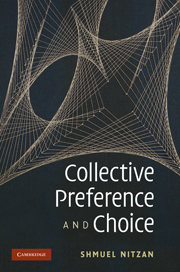Book contents
- Frontmatter
- Contents
- List of figures
- Preface
- Acknowledgments
- Part I Introduction
- Part II Different Preferences
- Part III Identical Preferences, Different Decisional Skills
- 11 Which rule is better: the expert rule or the simple majority rule? Decisional errors in dichotomous choice and Condorcet's jury theorem
- 12 The optimal decision rule under uncertain dichotomous choice
- Bibliography
- Author index
- Subject index
11 - Which rule is better: the expert rule or the simple majority rule? Decisional errors in dichotomous choice and Condorcet's jury theorem
Published online by Cambridge University Press: 05 June 2012
- Frontmatter
- Contents
- List of figures
- Preface
- Acknowledgments
- Part I Introduction
- Part II Different Preferences
- Part III Identical Preferences, Different Decisional Skills
- 11 Which rule is better: the expert rule or the simple majority rule? Decisional errors in dichotomous choice and Condorcet's jury theorem
- 12 The optimal decision rule under uncertain dichotomous choice
- Bibliography
- Author index
- Subject index
Summary
So far we have been concerned with various problems that were due mainly to the heterogeneity in individual preferences. However, various problems associated with the aggregation of individual decisions also arise when individuals share identical preferences, but have to make decisions given their different decisional capabilities. The problem of aggregating individual decisions under an uncertain dichotomous choice setting had already been studied in the eighteenth century and in recent years it has attracted continuous renewed interest. The last two chapters are devoted to various aspects of this problem.
In the social context, the move from individual to social preferences or from individual to social choice hinges on the applied aggregation rule. When individuals who share identical preferences operate in an uncertain environment, the problem of preference aggregation is no longer relevant, but the issue of choice aggregation is still pertinent. In an uncertain environment individuals may have identical or different decisional skills, but in any case they may err and make incorrect decisions. In this context, therefore, the aggregation problem takes the following form: What is the most appropriate collective decision rule for implementing the common objective of the individual decision makers? In this chapter we focus on the case of homogenous individuals who share identical decisional skills and on the case of (possibly different) unknown skills, and compare the performance of two collective decision rules: the simple majority rule and the expert rule – the rule based on the decision of a single individual, the most skillful individual.
Information
- Type
- Chapter
- Information
- Collective Preference and Choice , pp. 201 - 226Publisher: Cambridge University PressPrint publication year: 2009
